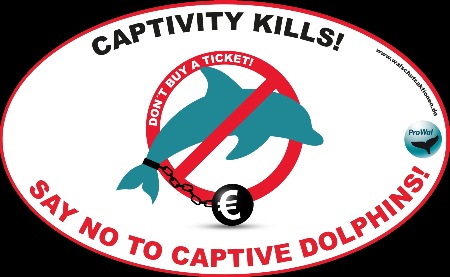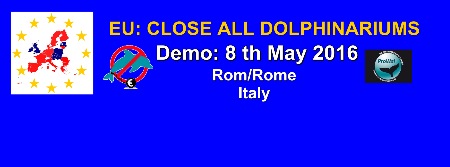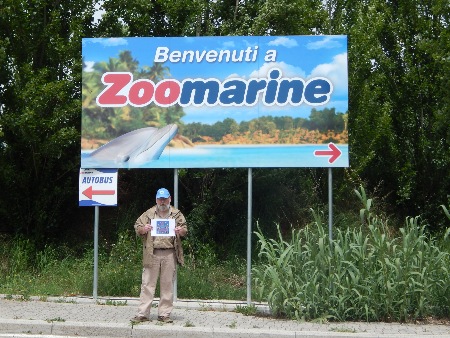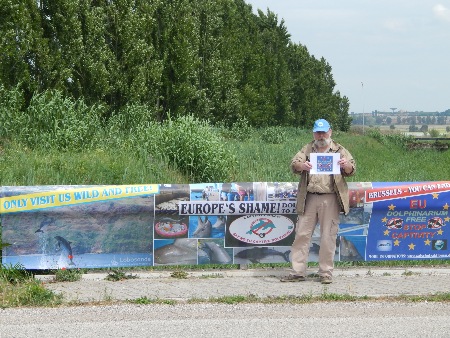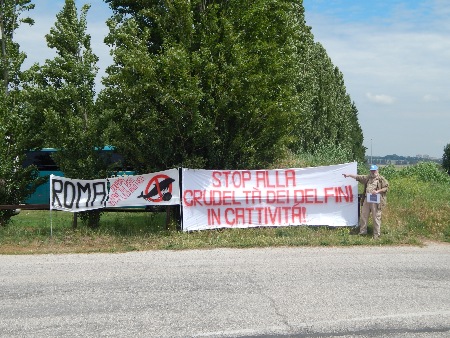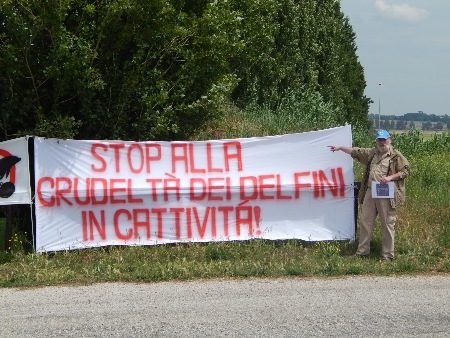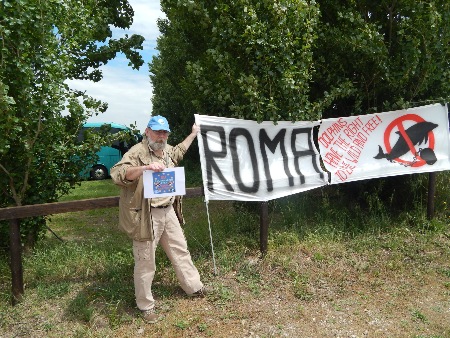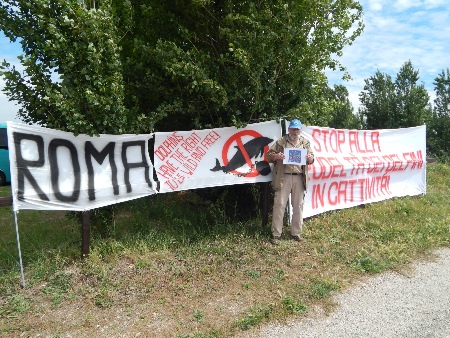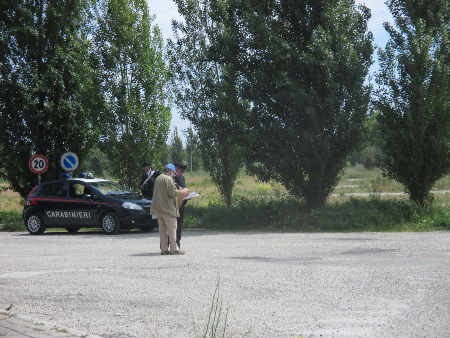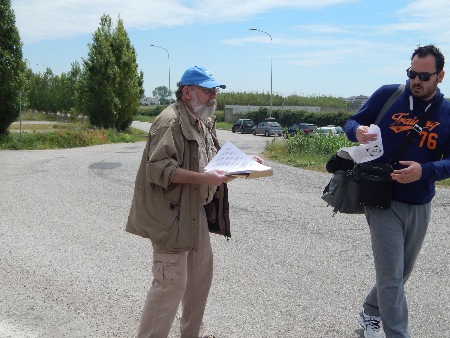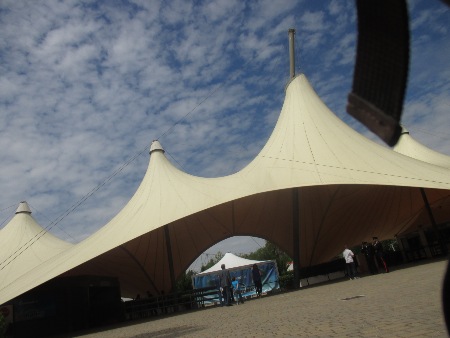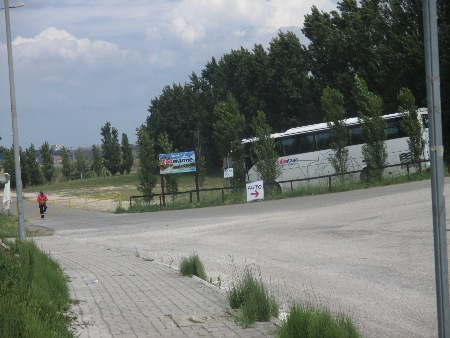

|


ZOOMARINE
Via Zara
00040 Pomezia
Roma
https://www.zoomarine.it/
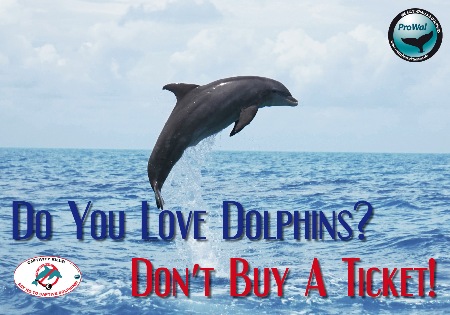
VIDEO – ProWal-Demo-Tour – “EU
– DOLPHINARIUM FREE” - https://www.youtube.com/watch?v=m0YoHnZ3QKA&feature=em-upload_owner
PRESSE-MITTEILUNG -
ProWal - 04.05.2016
Tierschützer kontra
Delfinarien – EU-Parlament soll helfen
Mit
einer Demonstrationstour durch sieben europäische Länder vor 19 Delfinarien
wollen Tierschützer der deutschen Tierschutzorganisation ProWal jetzt auf das
Leid von Delfinen in den 30 Show-Delfinarien in der EU aufmerksam machen und
diese letztendlich schließen. Sie setzen dabei auch auf die Unterstützung des
EU-Parlamentes in Brüssel.
Die
vierwöchige Demonstrationstour startet am 7. Mai in Deutschland und führt über
Italien, Frankreich, Spanien, Portugal und Holland bis nach Belgien. Sie endet
am 4. Juni mit einer Abschluss-Kundgebung vor dem Europäischen Parlament in
Brüssel.
ProWal
bemängelt nicht nur, dass den Meeressäugetieren in den Delfinarien viel zu
wenig Platz zur Verfügung steht, sie dort ihre natürlichen Bedürfnisse nicht
ausleben können, die Tiere durch den toten Fisch, den sie zum Fressen bekommen
oftmals ihren eigenen Flüssigkeitshaushalt nicht ausgleichen können, sondern
auch, dass die Tiere in einem Wasser leben müssen, welches chemisch mit Chlor
oder Ozon aufbereitet wird.
Andreas
Morlok, Geschäftsführer von ProWal: „In dieser Chemiebrühe können nicht einmal
Fische überleben! Obwohl schwerwiegende gesundheitliche Risiken wie
Dehydratation, Augen-, Haut- und Lungenprobleme längst bekannt sind, ist der
Einsatz von Chlor und Ozon für die Wasseraufbereitung in fast allen Delfinarien
gängige Praxis! Das muss nun endlich europaweit gesetzlich verboten werden!“
Nach
Angaben von ProWal führten Interventionen von Tierschützern letztes Jahr dazu,
dass die Regierung der Ukraine als erstes Land der Welt ein Gesetz beschlossen
hat, welches die Nutzung von Meerwasser in den Delfinarien vorschreibt! Ein
Neubau eines Delfinariums erhielt keine Betriebsgenehmigung, weil es diese
Auflage nicht erfüllen konnte.
Jürgen
Ortmüller, Geschäftsführer des deutschen Wal- und Delfinschutz-Forum (WDSF),
welcher die Kampagne von ProWal unterstützt, sieht die Delfinarien ohnehin im
Zugzwang: „Eine Anlage, die eine Gesetzesvorgabe für die Meerwassernutzung
nicht umsetzen kann, soll sich an der Errichtung einer betreuten Meeresbucht
beteiligen, in dem die Tiere verhaltensgerechter untergebracht werden können.
Die Errichtung eines solchen Sanctuary scheint ohnehin unumgänglich zu sein,
denn nach den Schließungen von etwa 50 Delfinarien in West-Europa ist es
mittlerweile eng in den verbliebenen Delfinarien geworden. Obwohl das
Delfinarium in Finnland seine Schließung auf dieses Frühjahr angekündigt hatte,
finden die Betreiber ganz offensichtlich keinen geeigneten Platz mehr für eine
geeignete Unterbringung ihrer vier Delfine. Die geplante Schließung wurde
deshalb auf den Herbst verschoben.“
ProWal
und WDSF wollen dem Europäischen Parlament nicht nur die Schadhaftigkeit des
Chemiewassers für die Delfine belegen, sondern auch, dass die immer wieder
vorgetragenen Argumente seitens der Delfinarien-Industrie Bildung, Wissenschaft
und Arterhaltung, um den Betrieb ihrer Anlagen überhaupt noch rechtfertigen zu
können, eine Farce und ein Deckmantel sind, um kommerzielle Interessen zu
verbergen.
Andreas
Morlok: „Die Besucher lernen in der künstlich geschaffenen Welt der Delfinarien
nichts über die Natürlichkeit von Delfinen. Sie erfahren auch nie etwas
darüber, dass schon mehrmals wildgefangene Delfine aus Japan nach Europa
gelangten, obwohl alle Delfinarien diese brutalen und blutigen Treibjagden
offiziell ablehnen. Die wissenschaftlichen Ergebnisse, die in Delfinarien
erzielt werden, sind auf freilebende Populationen nicht übertragbar und damit
wertlos. Mit Arterhaltung haben diese Anlagen in der EU ohnehin nichts zu tun,
denn noch nie wurde von ihnen ein in Gefangenschaft gehaltener Delfin
ausgewildert.
In
Wahrheit stecken hinter jedem Delfinarium rein finanzielle Interessen. Obwohl
es kaum noch Platz für weitere Tiere in den europäischen Delfinarien gibt, wird
weiterhin an der Zucht festgehalten, denn der Handel mit Delfinen ist immer
noch äußerst lukrativ. Wir werden dem Europäischen Parlament auch belegen, dass
ein Delfin, der in Italien geboren wurde, für 366.000 € an ein anderes
Delfinarium abgegeben wurde!
Wir
sind sehr zuversichtlich, dass das Europäische Parlament ein Gesetz beschließen
wird, um die miserablen Haltungsbedingungen für die Delfine zu beenden. Die
ersten Parlamentarier haben bereits ihre Unterstützung zugesagt.“
-----------------
-----------------
Animal rights
activists against dolphinaria – the EU Parliament should help
Animal rights
activists from the German animal welfare organisation ProWal now want to draw
attention to the suffering of dolphins in the 30 show dolphinaria in the EU by
arranging a tour of seven European countries to demonstrate outside 19 of them,
the ultimate aim being to have them closed down. In doing so they are also
relying on the support of the EU Parliament in Brussels.
The four-week
demonstration tour will start on 7th of May in Germany and will pass
through Italy, France, Spain, Portugal and the Netherlands to finish in
Belgium. It will end on 4 June with a final demonstration outside the European
Parliament in Brussels.
ProWal is
complaining not only that the marine mammals are given far too little space in
the dolphinaria, that they are unable to satisfy their natural requirements in
them and that in many cases the animals are unable to maintain their own fluid
balance with the dead fish they are given to eat, but also that the animals are
forced to live in water which is treated chemically with chlorine or
ozone.
Andreas Morlok, managing
director of ProWal: “Not even fish can survive in this chemical soup! Although
serious risks to health, such as dehydration, eye, skin and lung problems have
long been known, the use of chlorine and ozone for water treatment is current
practice in almost all dolphinaria! This must now be prohibited by law for good
throughout Europe!“
According to ProWal
interventions by animal rights activists last year resulted in the government
of Ukraine being the first country in the world to pass a law prescribing the
use of seawater in dolphinaria! No operating licence was issued to build a new
dolphinarium because it could not comply with this law.
Jürgen Ortmüller, managing
director of the German Whale and Dolphin Conservation Forum (WDSF), which
supports ProWal’s campaign, considers that the dolphinaria are under pressure
anyway: “A facility which is unable to implement a legal prescription for the
use of seawater should contribute to the creation of a sheltered bay in which
the animals can be accommodated in a more behaviourally correct manner. The
creation of such a sanctuary seems inevitable in any case because after the
closure of approximately 50 dolphinaria in Western Europe conditions in the
remaining dolphinaria have now become cramped. Although the dolphinarium in Finland announced its closure for
this spring, the operators are quite obviously unable to find more space for
the suitable accommodation of its four dolphins. The planned closure has
therefore been postponed until the autumn”.
ProWal and WDSF not
only wish to demonstrate to the European Parliament the harmfulness of the
chemical water to the dolphins but also the fact that the arguments that are
repeatedly put forward by the dolphinarium industry relating to education,
science and survival of the species in order to justify the operation of their
facilities are a farce and a cover used to conceal commercial interests.
Andreas Morlok: “The
visitors learn nothing about the natural behaviour of the dolphins in the
artificially created world of the dolphinaria, nor are they ever informed that
dolphins which have already been caught in the wild several times came to
Europe from Japan, although all the dolphinaria officially deny these brutal,
bloody dolphin hunts. The scientific results which are obtained in dolphinaria
cannot be transferred to the wild animals and are therefore worthless. In any
case these facilities in the EU have nothing to do with survival of the species
because no dolphin within the EU kept in captivity has ever been released back
into the wild.
In truth what lie
behind every dolphinarium are purely financial interests. Even though there is
hardly any space for more animals in the European dolphinaria, breeding
continues because trading in dolphins is still extremely lucrative. We will
also be providingthe European Parliament with evidence that a dolphin which was
born in Italy was delivered to another dolphinarium for 366,000 €!
We are very
confident that the European Parliament will pass a law to end the miserable
conditions in which the dolphins are kept. The first parliamentarians have
already promised their support”.
-----------------------
04.05.2016
- Comunicato Stampa
Gli
animalisti contro i delfinari –
Il Parlamento europeo deve
prestare il suo aiuto
Con un
tour dimostrativo attraverso sette paesi europei, davanti a 19 delfinari, gli
animalisti dell'organizzazione tedesca per la protezione degli animali ProWal
intendono richiamare l'attenzione sulla sofferenza dei delfini in 30 delfinari all'interno
dell'Unione europea e ottenerne infine la chiusura. In questo senso puntano
anche sull'appoggio del Parlamento europeo di Bruxelles.
Il tour
dimostrativo, che si svolge nell'arco di quattro settimane, prende il via il 7
maggio in Germania per poi passare per l'Italia, la Francia, la Spagna, il
Portogallo, l'Olanda e terminare infine in Belgio, dove avrà il suo epilogo il
4 giugno, con una manifestazione conclusiva davanti al Parlamento europeo di
Bruxelles.
ProWal non
lamenta solo il fatto che nei delfinari i mammiferi acquatici hanno troppo poco
spazio a disposizione, che non possono vivere appieno nel rispetto delle loro
esigenze naturali, che il pesce morto che viene loro dato per nutrirsi spesso
non è sufficiente a ristabilire il loro bilancio idrico, ma anche che l'acqua
in cui gli animali sono costretti a vivere è trattata chimicamente con cloro o
ozono.
Andreas
Morlok, direttore di ProWal: "In questo brodo chimico nemmeno i pesci
possono sopravvivere! Nonostante i gravi rischi per la salute (disidratazione,
problemi per gli occhi, la pelle, i polmoni) siano noti già da parecchio tempo,
in quasi tutti i delfinari l'impiego di cloro e ozono per il trattamento
dell'acqua è all'ordine del giorno! È ora che queste misure siano definitivamente
vietate in tutta Europa da leggi mirate!"
Secondo
quanto riferito da ProWal, lo scorso anno gli interventi degli animalisti hanno
fatto sì che il governo dell'Ucraina sia stato il primo in tutto il mondo a
promulgare una legge che, nei delfinari, prescrive l'impiego di acqua di mare!
La costruzione di un nuovo delfinario non ha ottenuto l'autorizzazione
all'esercizio poiché non poteva soddisfare questo requisito.
Jürgen
Ortmüller, direttore del forum tedesco in difesa delle balene e dei delfini
(WDSF - Wal-und Delfinschutz-Forum), che sostiene la campagna di ProWal,
ritiene che i delfinari siano alle strette: "Un impianto che non può
implementare una direttiva di legge per l'utilizzo dell'acqua di mare deve
partecipare alla realizzazione di un'area marina, simile a una baia, dove sia
possibile tenere gli animali con un maggiore rispetto del loro comportamento.
La creazione di un cosiddetto santuario sembra essere ormai inevitabile oltre
che indispensabile poiché, dopo la chiusura, nell'Europa occidentale, di circa
50 delfinari, nei delfinari rimasti lo spazio è diventato molto limitato. Anche
se l'unico delfinario della Finlandia aveva annunciato la chiusura per questa
primavera, molto evidentemente i gestori non trovano uno spazio idoneo in cui i
loro quattro delfini possano vivere in modo adeguato. La chiusura prevista è
stata pertanto posticipata all'autunno".
ProWal e
WDSF vogliono dimostrare al Parlamento europeo non solo la dannosità, per i
delfini, dell'acqua contenente le sostanze chimiche, ma anche che le
argomentazioni che continuano a essere avanzate e sostenute dall'industria dei
delfinari per poter ancora giustificare il funzionamento dei loro impianti,
ossia la funzione educativa, scientifica e di conservazione della specie, non
sono altro che una farsa e una copertura dietro cui si celano interessi
commerciali.
Andreas
Morlok: "Nel mondo artificiale dei delfinari, i visitatori non imparano
nulla sulla vita naturale dei delfini. Non vengono neppure a sapere che è già
più volte accaduto che molti dei delfini arrivati in Europa sono stati
originariamente catturati nel loro ambiente naturale in Giappone, anche se
tutti i delfinari rifiutano ufficialmente queste brutali e cruente modalità di
caccia. I risultati scientifici a cui si giunge nei delfinari non possono
essere trasmessi alle popolazioni che vivono libere e non hanno pertanto alcun
valore. Queste strutture in Europa non hanno niente a che vedere con la
conservazione della specie, in quanto nessuno dei delfini tenuto in cattività
presso le stesse è mai stato rimesso in libertà.
Dietro a
ogni delfinario si celano in realtà interessi puramente finanziari. Anche se
nei delfinari europei non c'è praticamente più posto per altri animali, si
prosegue tuttavia su questa linea, perché il commercio dei delfini continua a
essere estremamente lucrativo.
Al Parlamento europeo dimostreremo e proveremo
anche che un delfino, nato in Italia, è stato ceduto a un altro delfinario per
366.000 euro!
Siamo
molto fiduciosi che il Parlamento europeo approverà una legge per porre fine
alle miserabili condizioni di cattività in cui vengono tenuti i delfini. I
primi parlamentari hanno già garantito il loro appoggio e sostegno".
-----------------
Per
ulteriori informazioni sulla campagna "EU-Dolphinarium Free" consultare il sito internet di ProWal al link: http://walschutzaktionen.de/2881311/home.html
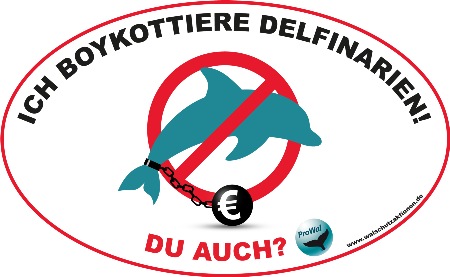
Aus
Tierschutzgründen - Wenn keine Recherche-Arbeit betrieben wird, um
mit der Zielsetzung ein Delfinarium zu schließen, dann machen Sie
bitte einen großen Bogen um solche Tiergefängnisse!
